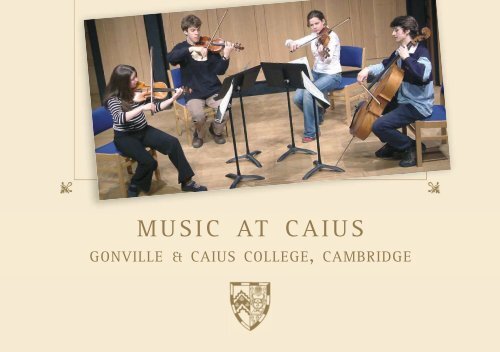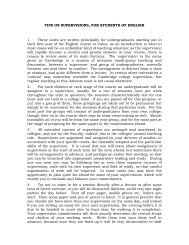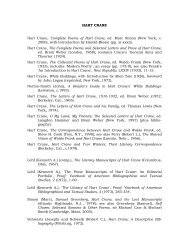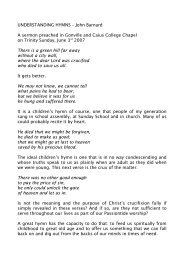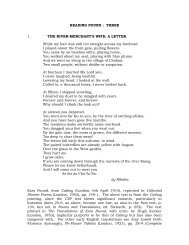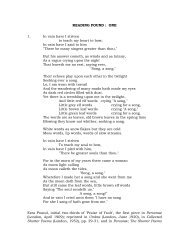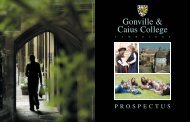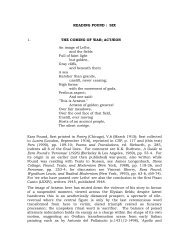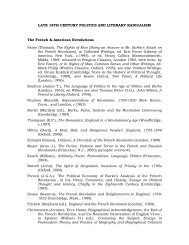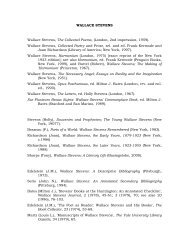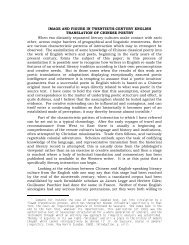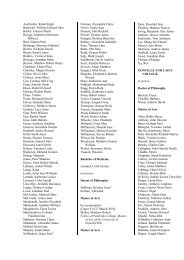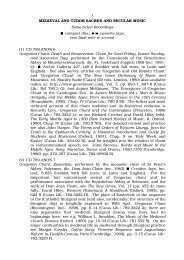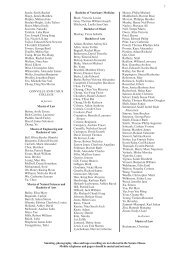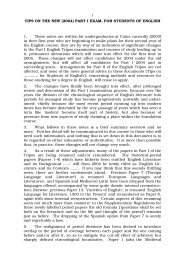MUSIC AT CAIUS - Gonville and Caius College
MUSIC AT CAIUS - Gonville and Caius College
MUSIC AT CAIUS - Gonville and Caius College
You also want an ePaper? Increase the reach of your titles
YUMPU automatically turns print PDFs into web optimized ePapers that Google loves.
Hanya Chlala/ArenaPALReading Music at <strong>Caius</strong><strong>Caius</strong> has one of the largest intakes ofmusic undergraduates among theCambridge <strong>College</strong>s (up to six studentseach year). The Music course is devised<strong>and</strong> taught principally by the Faculty ofMusic, <strong>and</strong> is described on the Faculty’sweb pages (www.mus.cam.ac.uk).Studying Music at <strong>Caius</strong> is fundamentallyno different from studying Music at anyCambridge college, but there are anumber of factors concerning <strong>Caius</strong>which might prove attractive whenchoosing a college. The <strong>College</strong> has twopermanent Fellows in Music, thecomposer Professor Robin Holloway, <strong>and</strong>the Precentor (choir director) & Directorof Studies in Music Dr Geoffrey Webber.There is also currently a Research Fellowin Musicology, James Davies, who isworking on early nineteenth-centurymusic <strong>and</strong> society. As Director of Studiesin Music, Geoffrey Webber makesarrangements for the small group tuitionprovided by the <strong>College</strong>, <strong>and</strong> teachesHarmony & Counterpoint <strong>and</strong> Baroque music. RobinHolloway teaches composition as well as historicaltopics ranging from the Romantic period to the presentday. The <strong>College</strong> Library houses one of the largestcollege collections of books on music <strong>and</strong> has anexcellent supply of music scores, including completeeditions of Bach <strong>and</strong> Mozart <strong>and</strong> important historicalcollections such as Musica Britannica. The <strong>College</strong>operates a book allowance scheme, <strong>and</strong> assistsgenerously with the costs of tuition for those wishingto give a recital as part of their final exams. All Musicstudents at <strong>Caius</strong> have access to Sibeliusmusic software, <strong>and</strong> are provided with apiano in their room for three years. The<strong>College</strong> is ideally placed geographicallyfor those reading Music; the mainaccommodation blocks at Harvey Courtare close to the Faculty of Music <strong>and</strong>also to the University Library, whichhouses one of the finest musiccollections in the country. The<strong>College</strong>’s Old Courts are situated in theheart of Cambridge, <strong>and</strong> close to thecity shops.
Music students at <strong>Caius</strong> have widely differing musicalinterests <strong>and</strong> backgrounds. Some have developed apassion for music principally through performance(including former members of the National YouthOrchestra of Great Britain), <strong>and</strong> others are dedicatedcomposers (including winners of The Guardian & BBCYoung Composer of the Year award), but the ability toperform or compose at a high level is not a prerequisitefor the study of Music as an academic subject. Thecharacteristic that unites all the Music students is thedesire to learn more about music; to discover howdifferent styles of music work at a technical level, <strong>and</strong>how these styles relate to the varying historical <strong>and</strong>cultural contexts in which the music was composed.The course allows individuals to pursue particularinterests in whatever aspect of music they wish. RecentMusic students at <strong>Caius</strong> have written dissertations ontopics as wide-ranging as Schumann, Mahler,Schoenberg, Zemlinsky, Lutoslawksi, Messiaen, MilesDavis, Bob Dylan, Busi Mhlongo, the music ofTurkmenistan, <strong>and</strong> protest music against the Iraq War.Options in the Faculty of Music have allowed studentsto pursue other interests ranging from medieval musicto contemporary disciplines such as those studied at theFaculty’s Centre for Music <strong>and</strong> Science.q w q wApplying to read Music at <strong>Caius</strong>Full details concerning the December interviews will besent to applicants following the closing date forAdmissions in October each year. Applications will beassessed on a variety of factors, including generalacademic record, examples of recent work (essays,compositions, Harmony & Counterpoint exercises, asappropriate), references, <strong>and</strong> the interview itself. As faras is possible, the personal <strong>and</strong> educational backgroundof applicants will be taken into account. Whilst thedetailed study of traditional Western harmony is usefulin advance of coming to Cambridge, a proven ability inthis area is not a requirement, as this is now taughtfrom scratch to those new to the discipline. It isrecommended that applicants should have keyboardskills of Grade 6 or above, though extra tuition in thisarea can be provided if necessary.
Musical FacilitiesThe regular venue for chamber music activities withinthe <strong>College</strong> is the Bateman Auditorium, which houses amodel B Steinway piano (2003). The <strong>College</strong> also hasseveral practice pianos both in the old part of <strong>College</strong><strong>and</strong> the main undergraduate blocks at Harvey Court. The<strong>College</strong> has a fine 2-manual harpsichord by Mackinnon<strong>and</strong> Waitzmann (1996), based on a French model datingfrom 1711, which is available for practice <strong>and</strong> concertuse. The Chapel organ is a 3-manual Klais (1981) <strong>and</strong>although it is used mostly by the two Organ Scholars itis available to any member of <strong>College</strong> for practice.The <strong>College</strong> Library contains a large selection of musicscores <strong>and</strong> literature on music, <strong>and</strong> also has a collectionof chamber music, containing scores <strong>and</strong> parts for manyworks, as well as double copies of much solo vocalrepertoire (allowing both singer <strong>and</strong> accompanist to havea copy). A broad range of classical CDs is also available<strong>and</strong> new purchases are made regularly, mostly at thesuggestion of students.2Music Prizes <strong>and</strong> AwardsEach year the <strong>College</strong> awards a number offinancial prizes <strong>and</strong> bursaries for music.The Compton Wills <strong>and</strong> Sir RudolphPeters funds allow prizes to be given inrecognition of outst<strong>and</strong>ing contributionstowards the musical life of the <strong>College</strong>.The H. L. Perry is awarded for the finestinstrumental performance in a <strong>College</strong>Concert during the course of the year. TheGrabowski Bursary helps one or morestudents each year to attend summercourses or receive specialist tuition in performance orconducting. Recent recipients have benefited fromattending courses at the Canford, Dartington <strong>and</strong>Britten-Pears Summer Schools <strong>and</strong> the Aspen StringCongress in Canada.222Eaden Lilley
1 21Contact detailsAppointments can be made at any time of theyear to visit <strong>Caius</strong> to talk to the Director ofMusic, Geoffrey Webber. Special <strong>College</strong> OpenDays are arranged by the Admissions Office.Dr Geoffrey Webbergaw25@cam.ac.uk (01223 332448)Professor Robin Hollowayrgh1000@cam.ac.ukAdmissions Officeadmissions@cai.cam.ac.uk (01223 332447)Designed <strong>and</strong> printed by Cambridge Printing, the printing business ofCambridge University Press. www.cambridgeprinting.orgqw q


